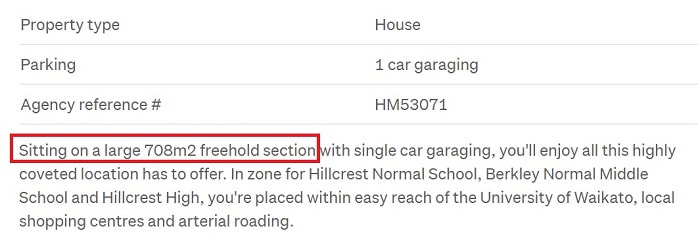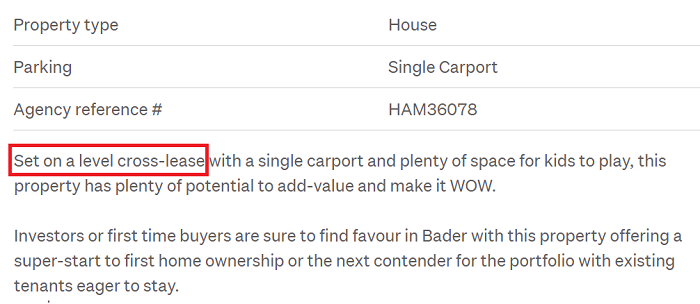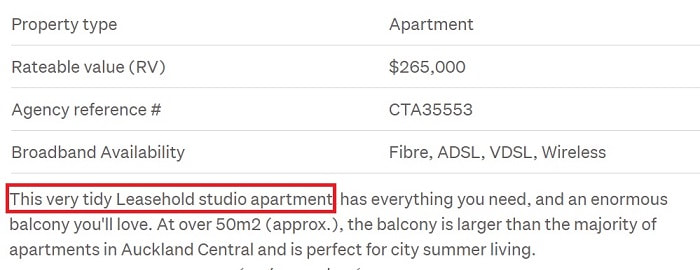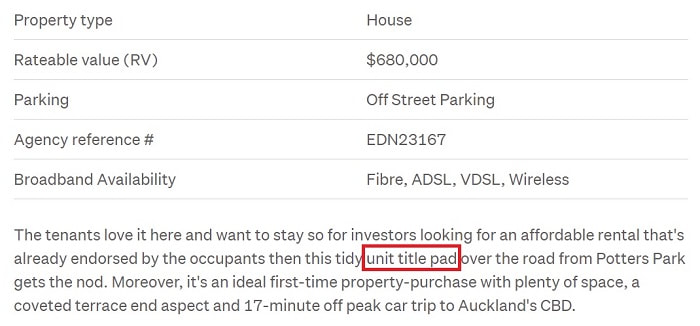Property Types in New Zealand - Freehold vs Leasehold vs Cross-Lease vs Unit Title
Our guide outlines which property type is best, the pros and cons of freehold, leasehold, cross-lease and unit titles and must-know facts to help you in your home buying process
Updated 24 January 2024
While New Zealand land laws are rather simple, understanding the pros and cons of each type is essential to ensure a fully-informed purchasing decision. When you buy a home, you buy much more than the property itself – you buy into a neighbourhood or community. However, when it comes to leasehold property, you don't buy the land - instead you lease lease it. This can have significant issues later on when you try to see it, especially if land prices have risen making the ground rents unaffordable to buyers.
Understanding how you hold ownership of the property is vital before purchasing or leasing a property. Our guide covers:
Understanding how you hold ownership of the property is vital before purchasing or leasing a property. Our guide covers:
Which Type of Property is Best?
It's widely accepted that freehold is the best type of property. This is largely because the ownership is absolute - you own the land and have unrestricted rights to its access. You don't pay ground rent nor do you have to negotiate with any other owner with regards to how you use it.
MoneyHub Founder Christopher Walsh shares his experience:
"Freehold property is, in most cases, the best investment. You own the land your home sits on, and you don't have to share it with anyone else. Buying freehold gives you certainty whereas a leasehold apartment puts you at the risk of a land price hike and the rent costs that go with that. It's also a lot harder to sell leasehold property as it has an uncertain future. Fortunately, most New Zealand property for sale is freehold".
MoneyHub Founder Christopher Walsh shares his experience:
"Freehold property is, in most cases, the best investment. You own the land your home sits on, and you don't have to share it with anyone else. Buying freehold gives you certainty whereas a leasehold apartment puts you at the risk of a land price hike and the rent costs that go with that. It's also a lot harder to sell leasehold property as it has an uncertain future. Fortunately, most New Zealand property for sale is freehold".
New Zealand's Property Types
Land laws in New Zealand aren't complicated, but there are differences in property types. We explain each property type below, the must-know facts, limitations, pros and cons, and an example of how real estate agents typically describe the property type.
FreeholdFreehold is the most common way to own property in New Zealand. You own the land and the home on it. You can do what you want (within reason) with the building/property as long as you have council approval, which is standard.
The critical component of freehold land is you don’t need anyone else’s approval (i.e. your neighbour’s permission) to make changes. Freehold Must-Know Facts:
Most common freehold properties: Houses, farms, commercial real estate |
Cross-Lease PropertyA Cross-Lease Property means you own property with other tenants. Each owner owns an equal part of the land and leases the property from the ‘group.’ Each cross-lease includes plans for buildings on the property, which each owner leases from themselves as a group.
Where can I find Cross-Lease Property? Cross-Lease Property is usually found where one section has been divided to develop two, three, four (or more) homes. For example:
Cross-Lease Property Must-Know Facts:
Most common cross-lease properties: Homes on back sections or sharing one section |
Leasehold LandLeasehold Land ownership means you don’t own the land. You pay rent to the owner, which gives you rights to the land and buildings on it. The lease terms determine how long you may have possession of the property and what you can do with it. Home owners only own the building on the land.
Where can I find Leasehold Land? Leasehold Land is common with apartments, and relatively uncommon with houses. Leasehold ownership comes at some risk - a recent Stuff article reported on a story where a leasehold property in Auckland’s Scene 3 Apartment building sold off-plan for $780,000. When the owner tried to sell, there were problems - a recent auction saw it passed in at $330,000. The issue is the uncertainty over ground rent costs – leasehold property is risky in this sense. In another example, a property sold originally for $350,000 was on offer for $120,000. $10,000+ per year ground rents are significant red flags to put off property investors (and force existing owners to sell). MoneyHub was quoted in a Stuff.co.nz article in November 2020 about leaseholders in Wellington agreeing to purchase the freehold land that was underneath their apartments. In almost every situation, buying the freehold land will increase the value of a property. Leasehold Land Must-Know Facts:
Most common leasehold properties: Apartments, although, in rare cases, some free-standing homes may be on a leasehold section More information: Our guide to leasehold property comprehensively outlines everything you need to know. |
Unit Title (also known as Stratum in Freehold)Unit Title means you own a unit within a building where there are many other owners too. You may own an apartment or unit individually, but you co-own common areas, including lifts, gardens, lobbies, and recreational areas through a body corporate which you'll automatically be a member of. The body corporate will also own the land for the benefit of all unit title holders, meaning you won't pay ground rent.
Unit Title Must-Know Facts:
Most common leasehold properties: Unit Titles are most common in apartments, especially around central city areas. |
Property Types - Frequently Asked Questions
Buying property is the biggest financial decision you will likely ever make, so it's important to understand what land type you're buying. Our frequently asked questions help explain the distinct differences between freehold, leasehold, unit title and cross-leases.
What is the highest form of property ownership?
Fee simple, also known as freehold ownership, is the highest form of property ownership and is the way most people own property.
What could affect ownership on a freehold property?
If there are any easements on your property, your neighbour may own or have rights to certain parts of the land, as may utility companies. There may also be covenants that dictate what you can and cannot do with the land.
What happens at the end of a leasehold term?
When the term expires, you return the land and buildings to the owner. All returned property should be in the condition outlined in the lease.
Can leasehold terms change?
Yes, leasehold terms can change according to the terms in the lease. Make sure your solicitor reviews the contract so you fully understand how and when ground rents may change and whether the owner can shorten the lease term.
Do cross lease agreements have restrictions?
Each cross lease agreement is unique. Read the fine print so you know what you can and can’t do with a property. For example, building a deck on your building may not be possible without agreement from all parties, if your lease agreement requires full agreement.
Can you get financing for a freehold property?
Yes, this is the most common type of property ownership, and most lenders allow financing for the building and land. Watch the easements and rights others have on the property before making a purchase decision.
Do you have title to the building, land and common areas in a unit title?
Yes, unlike a cross-lease, you own the individual unit you occupy and have title to it. You are not responsible for maintenance in common areas, but you also co-own those areas with all other owners. The Body Corporate is responsible for maintenance in those areas, but you’re responsible for the fees.











